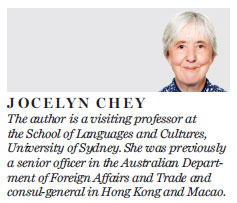Despite frequent laments about education quality, the kids are all right
Updated: 2016-06-10 07:55
By Paul Stapleton(HK Edition)
|
|||||||
Much has been said about the education system in Hong Kong. More often than not, the comments are critical: too much focus on exams; too much homework; too much rote memorization; and too much spoon-feeding. The latter two, especially, are indicative of a system that fails to provide activities that mimic life outside the classroom or include real life experiences. The result is said to be graduates not fully prepared to enter the workforce.
No matter how old you are, you will remember going on field trips in your school days. And if you think back to that time, the day or week you spent on a class outing probably stands out in your memory far more than the many days in the classroom.
Of course, educators have long known about the value of experiential learning. But these one-off ventures to the museum, or the "school trip", still tend to be ad hoc or sporadic - only a supplement to the "real" learning that takes place within the classroom.
This mentality is gradually changing as educators come to realize the learning that occurs outside the classroom, or co-curricular learning, needs to be more systematically included in the curriculum. Coincident with this realization has been a growing expectation in society that students need to become more aware of their community obligations. Employers and university admission offices want to see what their future employees or students have done beyond the classroom.
With this backdrop, in the past few years at the newly minted Education University of Hong Kong, we have married the two concepts above into one course and required all students to take a Co-curricular and Service Learning (CSL) course.
Most of these courses have links to charities, NGOs and schools. In the first couple of weeks, students are oriented in the classroom, after which they spend most of their required course hours in the community helping minorities and the elderly, or teaching underprivileged children, and the like. Toward the end of term, students return to the classroom and reflect on their experience. From all reports, students find the time they spent in the community very rewarding. The community contacts have also responded in a similar vein.
The CSL course that I teach is a bit different. I ask students to form groups of four to five members who then must visit a remote community in Hong Kong's hinterland. There, they have to meet the locals, interview them, and make a short documentary and website showcasing the community. In the past three years, students have visited communities ranging from Tai O in the west, to Tung Ping Chau in the east and many places in between. Apart from announcing the course requirements and explaining how to make documentaries and websites on the first day of class, I tell the students they are completely on their own and that I'll see them in three months when they present their websites and documentaries in class.
In each of the past three years that I have run this CSL course, nearly all students have come through with flying colors. On their own, they have formed multilingual and mixed-gender groups (a course requirement), and made some pretty classy websites. And although none of their documentaries is likely to win an Academy Award, they generally kept us watching through their five-minute length.
In over 100 of their reports, surprisingly, it is not the rural community that stands out in the students' memories, although many mentioned that they were glad they got the opportunity to visit a remote part of Hong Kong; nor was it the challenge of learning new technical skills working with websites and video.
Rather, what stood out most for the students were the pleasures and challenges of teamwork - working out schedules and modes of communication, including what language to use, as well as how to effectively assign tasks, such as photography, cinematography, post-production and translation, etc. In a word, things did not always go smoothly. However, it was the interpersonal involvement - more than any other - that garnered the deepest reflection. And that could be termed a good observation. In everyday life, it is the human relations, or more specifically learning to get along with others, that matters most. The students picked this up pretty quickly and despite a few hiccups in most groups, the end products were quite good.
So what is the upshot of the experience with these groups of students mostly from this region? Well, despite society's frequent lament about our ill-prepared youth and our less-than-adequate education system, the kids are all right.

(HK Edition 06/10/2016 page6)